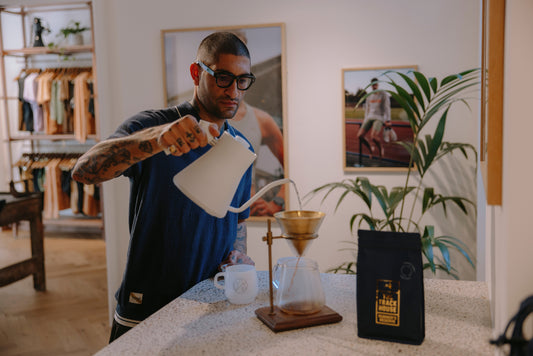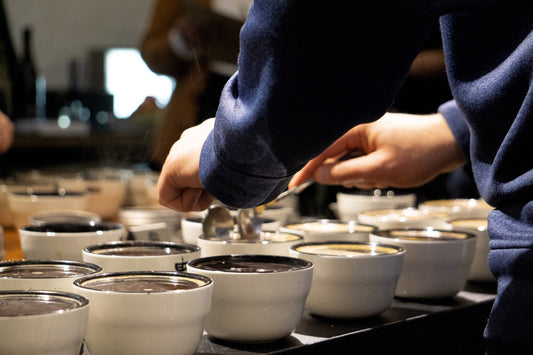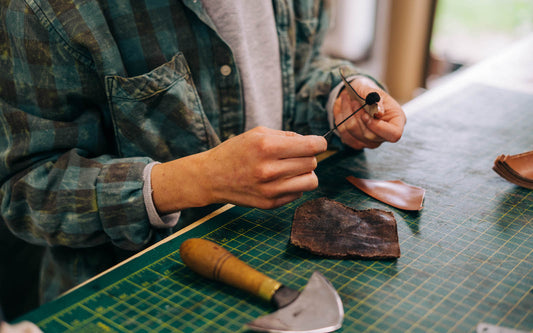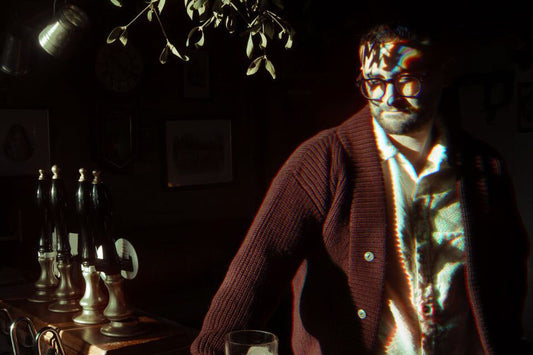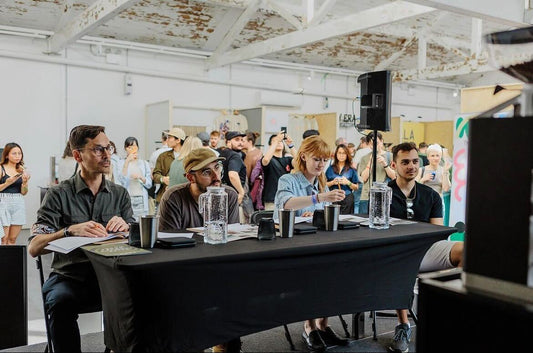
Nati’s On Priory is the type of neighbourhood cafe that everyone wishes their neighbourhood had, but in reality is a rare find. When you enter, it’s obvious that Nati’s is a café driven by unrelenting passion, and kept on track by a huge amount of care and a steadying hand, despite how effortless and natural it all appears to be. The steadying hand in this case belongs to Natalia Tarjanyi, or Nati as her regulars now know her, and after meeting her it’s not hard to see why she and her café have become a sort of beacon for the area, providing delicious food and coffee to a loyal crowd of regulars.
Stepping into the warmth of Nati’s, you’re immediately hit by the tantalising smells of fresh cakes being baked, fresh bread, and of course coffee. With high ceilings, classic marble tables and curved back wooden chairs, Nati’s has a touch of the European about it, and a touch of the New York too; in the sense of fun in it’s offering, and in the way the décor recalls some classic Jewish-American diners. Come to mention it, it has a touch of the Israeli too. Natalia has travelled a lot, taking inspiration from all over the world, and she has decided exactly what she wants her café to be.
Sitting under the soft light from the glass globe lampshades and admiring the colourful yet meticulously chosen artwork decorating the white walls, it’s hard to disagree with her vision. The staff are welcoming and friendly, excited to talk to every customer as though they were best friends, the coffee is delicious and made with care, and the cinnamon roll we taste (the last remaining one, to Nati’s insistence) is delicious with a great texture— surprisingly but pleasantly subtle and just the right balance of sticky, sweet, and chewy.
Nati sits down with us at one of the inviting marble tables for a chat.
Workshop Coffee: So how did Nati’s on Priory come about? What’s the story?
Nati: Well I always wanted to open my own place, but life happens. You start earning some money and you stop thinking about your dreams, but I always had the idea in my mind. I was always baking, and eventually by husband encouraged me to quit my job and just go for it.
WC: Did you have any experience in food and drink?
NC: No, I had never worked in food, catering, nothing. I decided to spend a lot of time doing research, a full year actually. Good ideas and baking skills aren’t enough. I met a lot of café owners — everyone was willing to sit down with me for an hour or two, and that gave me a better idea of the difficulties involved in running a café. Whenever anyone approaches me I do the same for them. And you know what? I look back and they were right. The issues they flagged up are my issues too. So I recommend people do that, take the time, it won’t all happen right away. I broke it all right down too, how much I need to make in a day to break even, down to the last detail.
WC: We can definitely relate to that detail-oriented approach. What are the difficulties involved in running Nati’s? What’s the hardest part?
N: [unflinchingly] Staff. Without a doubt, staff. There is always something to deal with. And I have a great team! It’s a wonderful team - we like spending time together, we have staff nights out, we do parties, we know each other’s birthdays, and I know they go out together without The Boss too and that’s great.
But with a small business its very difficult to… It’s hard to inspire your staff sometimes. If they stick with me I can give them a good place to work, I can give them training, but there’s not much more I can offer. To offer promotions I need to grow first, so it’s hard to keep really good staff. How do you reward people when you don’t have those positions available? I don’t have these answers.
WC: The café has a really great feel to it, what was your inspiration for the overall aesthetic?
N: I wanted it to feel like a Continental café. I would go home to Hungary and pick things up, or my family would get things for me, from flea markets mainly. We’ve got these great posters for example, ranging from 1930s to 1980s, it’s just not something you see everywhere. [Pointing to a hinged wooden contraption on the wall] That’s a newspaper reader from Hungary, I just love how it looks.

WC: The Continental influences definitely come across, everything feels familiar enough to be comfortable, but unfamiliar enough to still be interesting. By the way, these tables are great, they’re so spacious.
N: Yes these marble tables were something I really wanted, they’re from Germany and they’re just perfect, and the size too as you say. I actually went around cafés with a measuring tape and that’s how I decided what I wanted. I measured baby buggies — so you can get a double buggy through our door for example. The chairs were extremely important too, every detail was important to me.
WC: Was there a lot of work to do on the site?
N: Yes, all the refurb was done by me. We had to change the shop front from an awful aluminium frame, dealing with the council was a nightmare and all I wanted to do was replace it with the original front. I hired a local joiner, he used the same timber and he remade the sash windows exactly how they would’ve been originally, right down to the little carvings on the top which he matched to the ones next door. You know it’s a tiny detail, but he grew up here and he knew what he was doing. You can still see the original shop sign too, you have to have that sense of history.
WC: That way of doing things is quite rare now, right?
It feels more generous this way. It’s more me so I like it, that’s very important that you like it. I’m here seven days baking. It’s a control thing, I have to be here. They [the staff] always push me out though, they’re good without me.
WC: In terms of coffee, what’s the most important thing?
N: Quality and training. Constant training is important, for the sake of quality and for the staff to feel invested. It’s important to make sure everyone is up to standard. Workshop has been amazing, Sam [Brown, Workshop Coffee’s Quality and Development Manager] has been fantastic, the staff love their trainings.
WC: Do you have a good relationship with all of your suppliers?
N: Yeah, every one is a small company and we list them on the menu. The relationships are personal, and we are a supplier for the community as well. There’s a community garden where we take our coffee grounds, and the fruit and veg waste goes for composting. There’s a garden in the back too, in the summer we grow some of our ingredients - tomatoes, red currants, lots of herbs.
But you know, when I was first opening up and talking to suppliers, people would always ask me “is it a coffee place or a food place?”. I hated that question, I hated that I had to choose. Why can’t they both be good quality? So all the food is made here with good ingredients and care, and the coffee is the best you can get. I hate it when I have bad coffee with my food and I have to go get it somewhere else afterwards, it’s so disappointing. Also you know, the coffee is like advertising for the café. People come in, try the coffee, and if it’s good they’ll come back for brunch.

WC: Do you have a favourite menu item yourself?
N: I usually go for the shakshuka. I love it. It’s just something that always makes me happy. But the menu reflects my heritage, and my husband is Jewish so we’ve travelled to Israel a lot- the food there is incredible.
WC: If someone was describing this café to a friend who had never been, what would you want them to say?
N: It’s a neighbourhood café, we’re laid back here, friendly. We know our customers by name, we know their babies’ names. A lot of the mums who come in were pregnant when we opened and now they have kids that recognise me. One of them waves at me and calls me ‘Chicken Lady’. I can’t walk around the neighbourhood without people saying hello, my husband too - he gets “Oh, you’re Nati’s husband!" You know, it’s a place that makes you happy, it’s food that makes you happy.
WC: In a way it’s kind of soul food
N: Yeah, and it’s slow food. The cinnamon rolls take two days to make, it’s the real thing. It’s better for your stomach that way. It’s a traditional recipe and it takes time, it’s delicious and there are no shortcuts. It’s just inviting and welcoming. It’s the same reason why we let dogs in, we are very dog-friendly. In Hungary it’s not even a question. Obviously they are nowhere near the food, the kitchen is separated, we have high shelves. But for us it makes sense, we’re near to Ally Pally [Alexander Palace], there are so many dog walkers around… Bear with me I need to go check my cake!
WC: [A few minutes later when Nati returns]
N: Sorry, it’s Piccadilly Circus in my head.
WC: That’s quite alright. So, do you have a bestselling cake?
N: Yes, the cinnamon rolls normally sell out by 11, 12 o’ clock. We also have something called… Well it’s a Hungarian name, but it’s basically sweet enriched dough, usually with apricot or plum jam, but it’s a difficult word to pronounce with a funny spelling so we did a competition to come up with a name, and the winner would get a free brunch. So now it’s called a Hornsey Bun - we make them every Saturday, it’s just a weekend thing but they’re very popular now as well.
WC: We should let you get back to your cakes, but is there anything else you want people to know about? Any plans for the future?
N: We started doing a supper club once a week actually, and it’s working really well, so look out for more of those.
WC: That’s a really interesting idea, how did that come about?
N: Well we’re not open in the evening, and it’s a very residential area. We tried opening later at first but it wasn’t worth it. But you know, sometimes it’s difficult around here to go out for dinner, people don’t always have time to go into central London. So we decided we could use the space and offer something to the community. The first one we did was a great success, and people kept asking us to do more, so we put in another four dates and they all sold out.
WC: That’s great. What’s the vibe and style of the evening?
N: There’s always a theme, we’ve done Persian, we’ve done South American where we did some beautiful ceviche and things like that, the last one was Autumn themed. We just get everything fresh from the market, and some of the recipes are from my childhood. Like spaetzle, it’s like a handmade gnocchi type thing. It’s made from smoked ricotta which we smoked ourselves, served with some beautiful fresh mushrooms.
WC: Sounds delicious. It must be nice to have that space to experiment with the food a bit?
N: You can definitely lose creativity after a while with the menus, but we are all foodies here. I can be creative with the baking, designing new cakes etc. The chefs love the process of designing the menu, so it gives us a way to do that and make great food with good fresh ingredients. But it’s just a really great atmosphere, we rearrange the tables so we can sit people in their groups, and it’s BYO with no corkage or anything. Most people who have attended have re-booked.
WC: Plus as a bonus you get to use the space that’s sitting empty, and it’s all pre-booked so you can calculate all the costs
N: So there’s zero wastage, exactly. You know what I’m talking about. You have to keep coming up with new things, keep improving, listen to your customers and hope it works.
WC: Thank you so much for your time, we’ll let you get back to doing what you do best.
Address
163 Priory Road, London N8 8NB
w: http://www.natiscafe.co.uk/
f: https://www.facebook.com/natisonpriory
t: https://twitter.com/@natisonpriory
i: https://www.instagram.com/natisonpriory/
Hours
Weekdays: 8:30am – 5:00pm
Weekend: 9:00am – 5:00pm
Share:


